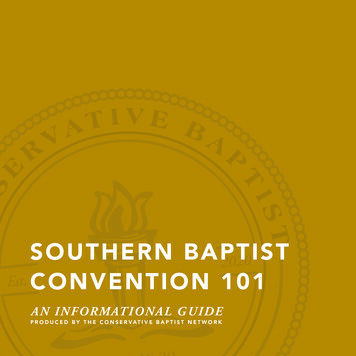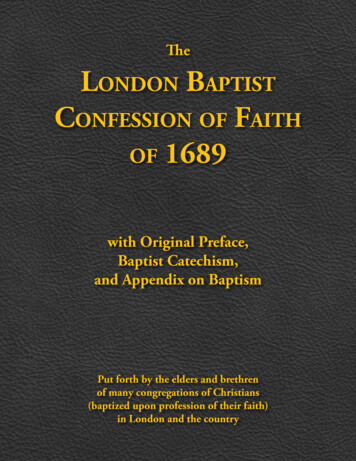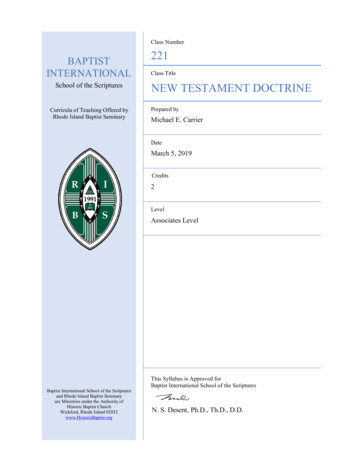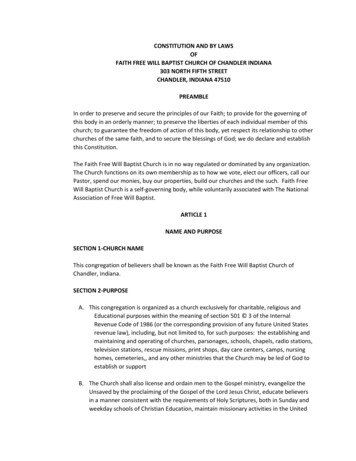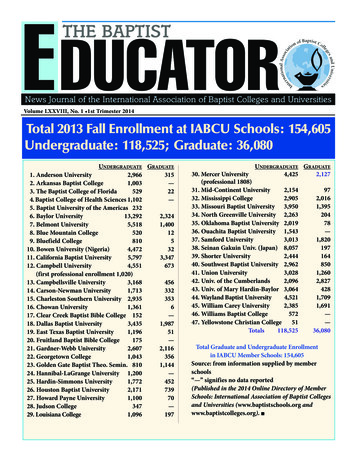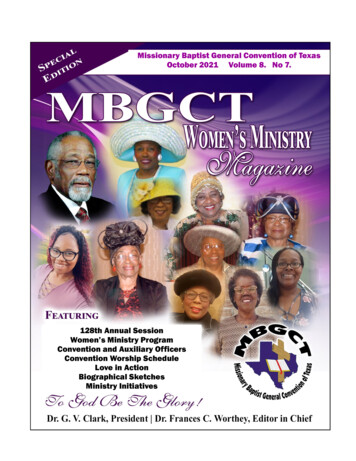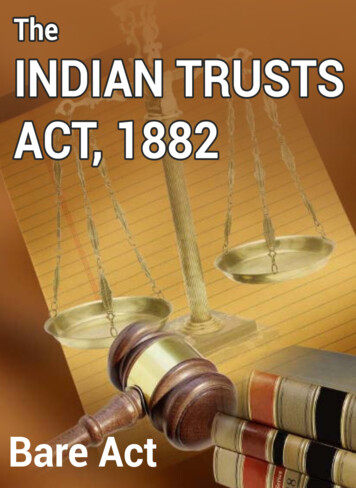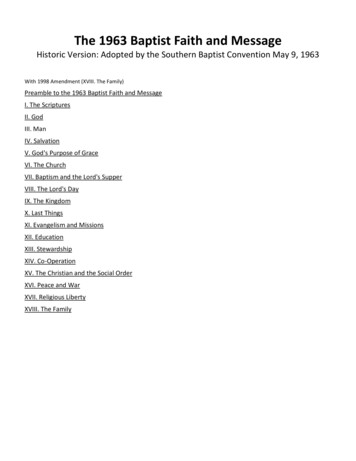
Transcription
The 1963 Baptist Faith and MessageHistoric Version: Adopted by the Southern Baptist Convention May 9, 1963With 1998 Amendment (XVIII. The Family)Preamble to the 1963 Baptist Faith and MessageI. The ScripturesII. GodIII. ManIV. SalvationV. God's Purpose of GraceVI. The ChurchVII. Baptism and the Lord's SupperVIII. The Lord's DayIX. The KingdomX. Last ThingsXI. Evangelism and MissionsXII. EducationXIII. StewardshipXIV. Co-OperationXV. The Christian and the Social OrderXVI. Peace and WarXVII. Religious LibertyXVIII. The Family
Report of Committee on Baptist Faith and MessageThe 1962 session of the Southern Baptist Convention, meeting in San Francisco, California, adopted the following motion."Since the report of the Committee on Statement of Baptist Faith and Message was adopted in 1925, there have been various statementsfrom time to time which have been made, but no overall statement which might be helpful at this time as suggested in Section 2 of thatreport, or introductory statement which might be used as an interpretation of the 1925 Statement."We recommend, therefore, that the president of this Convention be requested to call a meeting of the men now serving as presidents ofthe various state Conventions that would qualify as a member of the Southern Baptist Convention committee under Bylaw 18 to present tothe Convention in Kansas City some similar statement which shall serve as information to the churches, and which may serve as guidelinesto the various agencies of the Southern Baptist Convention. It is understood that any group or individuals may approach this committee tobe of service. The expenses of this committee shall be borne by the Convention Operating Budget."Your committee thus constituted begs leave to present its report as follows:Throughout its work your committee has been conscious of the contribution made by the statement of "The Baptist Faith and Message"adopted by the Southern Baptist Convention in 1925. It quotes with approval its affirmation that "Christianity is supernatural in its originand history. We repudiate every theory of religion which denies the supernatural elements in our faith."Furthermore, it concurs in the introductory "statement of the historic Baptist conception of the nature and function of confessions of faithin our religious and denominational life." It is, therefore, quoted in full as part of this report to the Convention."That they constitute a consensus of opinion of some Baptist body, large or small, for the general instruction and guidance of our ownpeople and others concerning those articles of the Christian faith which are most surely held among us. They are not intended to addanything to the simple conditions of salvation revealed in the New Testament, viz., repentance towards God and faith in Jesus Christ asSavior and Lord."That we do not regard them as complete statements of our faith, having any quality of finality or infallibility. As in the past so in the futureBaptists should hold themselves free to revise their statements of faith as may seem to them wise and expedient at any time."That any group of Baptists, large or small have the inherent right to draw up for themselves and publish to the world a confession of theirfaith whenever they may think it advisable to do so."That the sole authority for faith and practice among Baptists is the Scriptures of the Old and New Testaments. Confessions are only guidesin interpretation, having no authority over the conscience."That they are statements of religious convictions, drawn from the Scriptures, and are not to be used to hamper freedom of thought orinvestigation in other realms of life."The 1925 Statement recommended "the New Hampshire Confession of Faith, revised at certain points, and with some additional articlesgrowing our of certain needs . . . ." Your present committee has adopted the same pattern. It has sought to build upon the structure of the1925 Statement, keeping in mind the "certain needs" of our generation. At times it has reproduced sections of the Statement withoutchange. In other instances it has substituted words for clarity or added sentences for emphasis. At certain points it has combined articles,with minor changes in wording, to endeavor to relate certain doctrines to each other. In still others-e.g., "God" and "Salvation"-it hassought to bring together certain truths contained throughout the 1925 Statement in order to relate them more clearly and concisely. In nocase has it sought to delete from or to add to the basic contents of the 1925 Statement.Baptists are a people who profess a living faith. This faith is rooted and grounded in Jesus Christ who is "the same yesterday, and today, andfor ever." Therefore, the sole authority for faith and practice among Baptists is Jesus Christ whose will is revealed in the Holy Scriptures.A living faith must experience a growing understanding of truth and must be continually interpreted and related to the needs of each newgeneration. Throughout their history Baptist bodies, both large and small, have issued statements of faith which comprise a consensus oftheir beliefs. Such statements have never been regarded as complete, infallible statements of faith, nor as official creeds carryingmandatory authority. Thus this generation of Southern Baptists is in historic succession of intent and purpose as it endeavors to state for itstime and theological climate those articles of the Christian faith which are most surely held among us.Baptists emphasize the soul's competency before God, freedom in religion, and the priesthood of the believer. However, this emphasisshould not be interpreted to mean that there is an absence of certain definite doctrines that Baptists believe, cherish, and with which theyhave been and are now closely identified.It is the purpose of this statement of faith and message to set forth certain teachings which we believe.Herschel H. Hobbs, Chairman, Luther B. Hall, Howard M. Reaves, Robert Woodward, Ed. J. Packwood, Douglas Hudgins, C. Z. Holland, Paul Weber, Jr.W. B. Timberlake, R. A. Long, Charles R. Walker, Nane Starnes, Malcolm B. Knight, C. Hoge Hockensmith , Dick H Hall, Jr., Hugh R. Bumpas, C. V. KoonsDavid G. Anderson, Walter R. Davis, E. Warren Rust, Garth Pybas, James H. Landes, V. C. Kruschwitz, R. P. Downey
I. The ScripturesThe Holy Bible was written by men divinely inspired and is the record of God's revelation of Himself to man. It is a perfect treasure ofdivine instruction. It has God for its author, salvation for its end, and truth, without any mixture of error, for its matter. It reveals theprinciples by which God judges us; and therefore is, and will remain to the end of the world, the true center of Christian union, andthe supreme standard by which all human conduct, creeds, and religious opinions should be tried. The criterion by which the Bible isto be interpreted is Jesus Christ.Ex. 24:4; Deut. 4:1-2; 17:19; Josh. 8:34; Psalm 19:7-10; 119:11, 89, 105, 140; Isa. 34:16; 40:8; Jer. 15:16; 36; Matt. 5:17-18; 22:29;Luke 21:33; 24:44-46; John 5:39; 16:13-15; 17:17; Acts 2:16 ff.; 17:11; Rom. 15:4; 16:25-26; 2 Tim. 3:15-17; Heb. 1:1-2; 4:12; 1 Peter1:25; 2 Peter 1:19-21.II. GodThere is one and only one living and true God. He is an intelligent, spiritual, and personal Being, the Creator, Redeemer, Preserver,and Ruler of the universe. God is infinite in holiness and all other perfections. To Him we owe the highest love, reverence, andobedience. The eternal God reveals Himself to us as Father, Son, and Holy Spirit, with distinct personal attributes, but withoutdivision of nature, essence, or being.A. God the FatherGod as Father reigns with providential care over His universe, His creatures, and the flow of the stream of human history accordingto the purposes of His grace. He is all powerful, all loving, and all wise. God is Father in truth to those who become children of Godthrough faith in Jesus Christ. He is fatherly in His attitude toward all men.Gen. 1:1; 2:7; Ex. 3:14; 6:2-3; 15:11 ff.; 20:1 ff.; Lev. 22:2; Deut. 6:4; 32:6; 1 Chron. 29:10; Psalm 19:1-3; Isa. 43:3, 15; 64:8; Jer. 10:10; 17:13;Matt. 6:9 ff.; 7:11; 23:9; 28:19; Mark 1:9-11; John 4:24; 5:26; 14:6-13; 17:1-8; Acts 1:7; Rom. 8:14-15; 1 Cor. 8:6; Gal. 4:6; Eph. 4:6; Col. 1:15;1 Tim. 1:17; Heb. 11:6; 12:9; 1 Peter 1:17; 1 John 5:7.B. God the SonChrist is the eternal Son of God. In His incarnation as Jesus Christ He was conceived of the Holy Spirit and born of the virgin Mary.Jesus perfectly revealed and did the will of God, taking upon Himself the demands and necessities of human nature and identifyingHimself completely with mankind yet without sin. He honored the divine law by His personal obedience, and in His death on thecross He made provision for the redemption of men from sin. He was raised from the dead with a glorified body and appeared to Hisdisciples as the person who was with them before His crucifixion. He ascended into heaven and is now exalted at the right hand ofGod where He is the One Mediator, partaking of the nature of God and of man, and in whose Person is effected the reconciliationbetween God and man. He will return in power and glory to judge the world and to consummate His redemptive mission. He nowdwells in all believers as the living and ever present Lord.Gen. 18:1 ff.; Psalm 2:7 ff.; 110:1 ff.; Isa. 7:14; 53; Matt. 1:18-23; 3:17; 8:29; 11:27; 14:33; 16:16, 27; 17:5; 27; 28:1-6, 19; Mark 1:1; 3:11;Luke 1:35; 4:41; 22:70; 24:46; John 1:1-18, 29; 10:30, 38; 11:25-27; 12:44-50; 14:7- 11; 16:15-16, 28; 17:1-5, 21-22; 20:1-20, 28; Acts 1:9;2:22- 24; 7:55-56; 9:4-5, 20; Rom. 1:3-4; 3:23-26; 5:6-21; 8:1-3, 34; 10:4; 1 Cor. 1:30; 2:2; 8:6; 15:1-8, 24-28; 2 Cor. 5:19- 21; Gal. 4:4-5; Eph.1:20; 3:11; 4:7-10; Phil. 2:5-11; Col. 1:13-22; 2:9; 1 Thess. 4:14-18; 1 Tim. 2:5-6; 3:16; Titus 2:13-14; Heb. 1:1-3; 4:14-15; 7:14-28; 9:12-15,24-28; 12:2; 13:8; 1 Peter 2:21-25; 3:22; 1 John 1:7-9; 3:2; 4:14-15; 5:9; 2 John 7-9; Rev. 1:13-16; 5:9-14; 12:10-11; 13:8; 19:16.C. God the Holy SpiritThe Holy Spirit is the Spirit of God. He inspired holy men of old to write the Scriptures. Through illumination He enables men tounderstand truth. He exalts Christ. He convicts of sin, of righteousness and of judgment. He calls men to the Saviour, and effectsregeneration. He cultivates Christian character, comforts believers, and bestows the spiritual gifts by which they serve God throughHis church. He seals the believer unto the day of final redemption. His presence in the Christian is the assurance of God to bring thebeliever into the fullness of the stature of Christ. He enlightens and empowers the believer and the church in worship, evangelism,and service.Gen. 1:2; Judg. 14:6; Job 26:13; Psalm 51:11; 139:7 ff.; Isa. 61:1-3; Joel 2:28-32; Matt. 1:18; 3:16; 4:1; 12:28-32; 28:19; Mark 1:10, 12; Luke1:35; 4:1, 18-19; 11:13; 12:12; 24:49; John 4:24; 14:16-17, 26; 15:26; 16:7-14; Acts 1:8; 2:1-4, 38; 4:31; 5:3; 6:3; 7:55; 8:17, 39; 10:44; 13:2;15:28; 16:6; 19:1-6; Rom. 8:9-11, 14-16, 26-27; 1 Cor. 2:10- 14; 3:16; 12:3-11; Gal. 4:6; Eph. 1:13-14; 4:30; 5:18; 1 Thess. 5:19; 1 Tim. 3:16;4:1; 2 Tim. 1:14; 3:16; Heb. 9:8, 14; 2 Peter 1:21; 1 John 4:13; 5:6-7; Rev. 1:10; 22:17.
III. ManMan was created by the special act of God, in His own image, and is the crowning work of His creation. In the beginning man was innocent ofsin and was endowed by His Creator with freedom of choice. By his free choice man sinned against God and brought sin into the human race.Through the temptation of Satan man transgressed the command of God, and fell from his original innocence; whereby his posterity inherit anature and an environment inclined toward sin, and as soon as they are capable of moral action become transgressors and are undercondemnation. Only the grace of God can bring man into His holy fellowship and enable man to fulfill the creative purpose of God. Thesacredness of human personality is evident in that God created man in His own image, and in that Christ died for man; therefore every manpossesses dignity and is worthy of respect and Christian love.Gen. 1:26-30; 2:5, 7, 18-22; 3; 9:6; Psalm 1; 8:3-6; 32:1-5; 51:5; Isa. 6:5; Jer. 17:5; Matt. 16:26; Acts 17:26- 31; Rom. 1:19-32; 3:10-18, 23; 5:6, 12, 19;6:6; 7:14-25; 8:14-18, 29; 1 Cor. 1:21-31; 15:19, 21-22; Eph. 2:1-22; Col. 1:21-22; 3:9-11.IV. SalvationSalvation involves the redemption or the whole man, and is offered freely to all who accept Jesus Christ as Lord and Saviour, who by His ownblood obtained eternal redemption for the believer. In its broadest sense salvation includes regeneration, sanctification, and glorification. A.Regeneration, or the new birth, is a work of God's grace whereby believers become new creatures in Christ Jesus. It is a change of heartwrought by the Holy Spirit through conviction of sin, to which the sinner responds in repentance toward God and faith in the Lord Jesus Christ.Repentance and faith are inseparable experiences of grace. Repentance is a genuine turning from sin toward God. Faith is the acceptance ofJesus Christ and commitment of the entire personality to Him as Lord and Saviour. Justification is God's gracious and full acquittal uponprinciples of His righteousness of all sinners who repent and believe in Christ. Justification brings the believer into a relationship of peace andfavor with God. B. Sanctification is the experience, beginning in regeneration, by which the believer is set apart to God's purposes, and isenabled to progress toward moral and spiritual perfection through the presence and power of the Holy Spirit dwelling in him. Growth in graceshould continue throughout the regenerate person's life. C. Glorification is the culmination of salvation and is the final blessed and abidingstate of the redeemed.Gen. 3:15; Ex. 3:14-17; 6:2-8; Matt. 1:21; 4:17; 16:21- 26; 27:22 to 28:6; Luke 1:68-69; 2:28-32; John 1:11-14, 29; 3:3-21, 36; 5:24; 10:9, 28-29;15:1-16; 17:17; Acts 2:21; 4:12; 15:11; 16:30-31; 17:30-31; 20:32; Rom. 1:16-18; 2:4; 3:23-25; 4:3 ff.; 5:8-10; 6:1-23; 8:1-18, 29-39; 10:9-10, 13;13:11-14; 1 Cor. 1:18, 30; 6:19-20; 15:10; 2 Cor. 5:17- 20; Gal. 2:20; 3:13; 5:22-25; 6:15; Eph. 1:7; 2:8-22; 4:11- 16; Phil. 2:12-13; Col. 1:9-22; 3:1ff.; 1 Thess. 5:23-24; 2 Tim. 1:12; Titus 2:11-14; Heb. 2:1-3; 5:8-9; 9:24-28; 11:1 to 12:8; 14; James 2:14-26; 1 Peter 1:2-23; 1 John 1:6 to 2:11;Rev. 3:20; 21:1 to 22:5.V. God's Purpose of GraceElection is the gracious purpose of God, according to which He regenerates, sanctifies, and glorifies sinners. It isconsistent with the free agency of man, and comprehends all the means in connection with the end. It is a glorious display of God's sovereigngoodness, and is infinitely wise, holy, and unchangeable. It excludes boasting and promotes humility. All true believers endure to the end.Those whom God has accepted in Christ, and sanctified by His Spirit, will never fall away from the State of grace, but shall persevere to the end.Believers may fall into sin through neglect and temptation, whereby they grieve the Spirit, impair their graces and comforts, bring reproach onthe cause of Christ, and temporal judgments on themselves, yet they shall be kept by the power of God through faith unto salvation.Gen. 12:1-3; Ex. 19:5-8; 1 Sam. 8:4-7, 19-22; Isa. 5:1-7; Jer. 31:31 ff.; Matt. 16:18-19; 21:28-45; 24:22, 31; 25:34; Luke 1:68-79; 2:29-32; 19:4144; 24:44-48; John 1:12-14; 3:16; 5:24; 6:44-45, 65; 10:27-29; 15:16; 17:6, 12, 17-18; Acts 20:32; Rom. 5:9-10; 8:28-39; 10:12-15; 11:5-7, 26-36;1 Cor. 1:1-2; 15:24-28; Eph. 1:4-23; 2:1-10; 3:1-11; Col. 1:12-14; 2 Thess. 2:13-14; 2 Tim. 1:12; 2:10, 19; Heb. 11:39 to 12:2; 1 Peter 1:2-5, 13;2:4-10; 1 John 1:7-9; 2:19; 3:2.VI. The ChurchA New Testament church of the Lord Jesus Christ is a local body of baptized believers who are associated by covenant in the faithand fellowship of the gospel, observing the two ordinances of Christ, committed to His teachings, exercising the gifts, rights, andprivileges invested in them by His Word, and seeking to extend the gospel to the ends of the earth. This church is an autonomousbody, operating through democratic processes under the Lordship of Jesus Christ. In such a congregation members are equallyresponsible. Its Scriptural officers are pastors and deacons. The New Testament speaks also of the church as the body of Christ whichincludes all of the redeemed of all the ages.Matt. 16:15-19; 18:15-20; Acts 2:41-42, 47; 5:11-14; 6:3-6; 13:1-3; 14:23, 27; 15:1-30; 16:5; 20:28; Rom. 1:7; 1 Cor. 1:2; 3:16; 5:4-5;7:17; 9:13-14; 12; Eph. 1:22-23; 2:19-22; 3:8-11, 21; 5:22-32; Phil. 1:1; Col. 1:18; 1 Tim. 3:1-15; 4:14; 1 Peter 5:1-4; Rev. 2-3; 21:2-3.
VII. Baptism and the Lord's SupperChristian baptism is the immersion of a believer in water in the name of the Father, the Son, and the Holy Spirit. It is an act ofobedience symbolizing the believer's faith in a crucified, buried, and risen Saviour, the believer's death to sin, the burial of the oldlife, and the resurrection to walk in newness of life in Christ Jesus. It is a testimony to his faith in the final resurrection of the dead.Being a church ordinance, it is prerequisite to the privileges of church membership and to the Lord's Supper. The Lord's Supper is asymbolic act of obedience whereby members of the church, through partaking of the bread and the fruit of the vine, memorializethe death of the Redeemer and anticipate His second coming.Matt. 3:13-17; 26:26-30; 28:19-20; Mark 1:9-11; 14:22-26; Luke 3:21-22; 22:19-20; John 3:23; Acts 2:41-42; 8:35-39; 16:30-33; Acts20:7; Rom. 6:3-5; 1 Cor. 10:16, 21; 11:23-29; Col. 2:12.VIII. The Lord's DayThe first day of the week is the Lord's Day. It is a Christian institution for regular observance. It commemorates the resurrection ofChrist from the dead and should be employed in exercises of worship and spiritual devotion, both public and private, and byrefraining from worldly amusements, and resting from secular employments, work of necessity and mercy only being excepted.Ex. 20:8-11; Matt. 12:1-12; 28:1 ff.; Mark 2:27-28; 16:1- 7; Luke 24:1-3, 33-36; John 4:21-24; 20:1, 19-28; Acts 20:7; 1 Cor. 16:1-2;Col. 2:16; 3:16; Rev. 1:10.IX. The KingdomThe Kingdom of God includes both His general sovereignty over the universe and His particular kingship over men who willfullyacknowledge Him as King. Particularly the Kingdom is the realm of salvation into which men enter by trustful, childlike commitmentto Jesus Christ. Christians ought to pray and to labor that the Kingdom may come and God's will be done on earth. The fullconsummation of the Kingdom awaits the return of Jesus Christ and the end of this age.Gen. 1:1; Isa. 9:6-7; Jer. 23:5-6; Matt. 3:2; 4:8-10, 23; 12:25-28; 13:1-52; 25:31-46; 26:29; Mark 1:14-15; 9:1; Luke 4:43; 8:1; 9:2;12:31-32; 17:20-21; 23:42; John 3:3; 18:36; Acts 1:6-7; 17:22-31; Rom. 5:17; 8:19; 1 Cor. 15:24-28; Col. 1:13; Heb. 11:10, 16; 12:28; 1Peter 2:4-10; 4:13; Rev. 1:6, 9; 5:10; 11:15; 21-22.X. Last ThingsGod, in His own time and in His own way, will bring the world to its appropriate end. According to His promise, Jesus Christ willreturn personally and visibly in glory to the earth; the dead will he raised; and Christ will judge all men in righteousness. Theunrighteous will be consigned to Hell, the place of everlasting punishment. The righteous in their resurrected and glorified bodieswill receive their reward and will dwell forever in Heaven with the Lord.Isa. 2:4; 11:9; Matt. 16:27; 18:8-9; 19:28; 24:27, 30, 36, 44; 25:31-46; 26:64; Mark 8:38; 9:43-48; Luke 12:40, 48; 16:19-26; 17:22-37;21:27-28; John 14:1-3; Acts 1:11; 17:31; Rom. 14:10; 1 Cor. 4:5; 15:24-28, 35-58; 2 Cor. 5:10; Phil. 3:20-21; Col. 1:5; 3:4; 1 Thess.4:14-18; 5:1 ff.; 2 Thess. 1:7 ff.; 2; 1 Tim. 6:14; 2 Tim. 4:1, 8; Titus 2:13; Heb. 9:27-28; James 5:8; 2 Peter 3:7 ff.; 1 John 2:28; 3:2; Jude14; Rev. 1:18; 3:11; 20 to 22:13.XI. Evangelism and MissionsIt is the duty and privilege of every follower of Christ and of every church of the Lord Jesus Christ to endeavor to make disciples of allnations. The new birth of man's spirit by God's Holy Spirit means the birth of love for others. Missionary effort on the part of all reststhus upon a spiritual necessity of the regenerate life, and is expressly and repeatedly commanded in the teachings of Christ. It is theduty of every child of God to seek constantly to win the lost to Christ by personal effort and by all other methods in harmony withthe gospel of Christ.Gen. 12:1-3; Ex. 19:5-6; Isa. 6:1-8; Matt. 9:37-38; 10:5- 15; 13:18-30, 37-43; 16:19; 22:9-10; 24:14; 28:18-20; Luke 10:1-18; 24:46-53;John 14:11-12; 15:7-8, 16; 17:15; 20:21; Acts 1:8; 2; 8:26-40; 10:42-48; 13:2-3; Rom. 10:13-15; Eph. 3:1-11; 1 Thess. 1:8; 2 Tim. 4:5;Heb. 2:1-3; 11:39 to 12:2; 1 Peter 2:4-10; Rev. 22:17.
XII. EducationThe cause of education in the Kingdom of Christ is co-ordinate with the causes of missions and general benevolence, and shouldreceive along with these the liberal support of the churches. An adequate system of Christian schools is necessary to a completespiritual program for Christ's people. In Christian education there should be a proper balance between academic freedom andacademic responsibility. Freedom in any orderly relationship of human life is always limited and never absolute. The freedom of ateacher in a Christian school, college, or seminary is limited by the pre-eminence of Jesus Christ, by the authoritative nature of theScriptures, and by the distinct purpose for which the school exists.Deut. 4:1, 5, 9, 14; 6:1-10; 31:12-13; Neh. 8:1-8; Job 28:28; Psalm 19:7 ff.; 119:11; Prov. 3:13 ff.; 4:1-10; 8:1-7, 11; 15:14; Eccl. 7:19;Matt. 5:2; 7:24 ff.; 28:19-20; Luke 2:40; 1 Cor. 1:18-31; Eph. 4:11-16; Phil. 4:8; Col. 2:3, 8-9; 1 Tim. 1:3-7; 2 Tim. 2:15; 3:14-17; Heb.5:12 to 6:3; James 1:5; 3:17.XIII. StewardshipGod is the source of all blessings, temporal and spiritual; all that we have and are we owe to Him. Christians have a spiritualdebtorship to the whole world, a holy trusteeship in the gospel, and a binding stewardship in their possessions. They are thereforeunder obligation to serve Him with their time, talents, and material possessions; and should recognize all these as entrusted to themto use for the glory of God and for helping others. According to the Scriptures, Christians should contribute of their meanscheerfully, regularly, systematically, proportionately, and liberally for the advancement of the Redeemer's cause on earth.Gen. 14:20; Lev. 27:30-32; Deut. 8:18; Mal. 3:8-12; Matt. 6:1-4, 19-21; 19:21; 23:23; 25:14-29; Luke 12:16-21, 42; 16:1- 13; Acts 2:4447; 5:1-11; 17:24-25; 20:35; Rom. 6:6-22; 12:1-2; 1 Cor. 4:1-2; 6:19-20; 12; 16:1-4; 2 Cor. 8-9; 12:15; Phil. 4:10-19; 1 Peter 1:18-19.XIV. CooperationChrist's people should, as occasion requires, organize such associations and conventions as may best secure cooperation for thegreat objects of the Kingdom of God. Such organizations have no authority over one another or over the churches. They arevoluntary and advisory bodies designed to elicit, combine, and direct the energies of our people in the most effective manner.Members of New Testament churches should cooperate with one another in carrying forward the missionary, educational, andbenevolent ministries for the extension of Christ's Kingdom. Christian unity in the New Testament sense is spiritual harmony andvoluntary cooperation for common ends by various group of Christ's people. Cooperation is desirable between the various Christiandenominations, when the end to be attained is itself justified, and when such cooperation involves no violation of conscience orcompromise of loyalty to Christ and His Word as revealed in the New Testament.Ex. 17:12; 18:17 ff.; Judg. 7:21; Ezra 1:3-4; 2:68-69; 5:14-15; Neh. 4; 8:1-5; Matt. 10:5-15; 20:1-16; 22:1-10; 28:19-20; Mark 2:3; Luke10:1 ff.; Acts 1:13-14; 2:1 ff.; 4:31-37; 13:2-3; 15:1-35; 1 Cor. 1:10-17; 3:5-15; 12; 2 Cor. 8-9; Gal. 1:6-10; Eph. 4:1-16; Phil. 1:15-18.XV. The Christian and the Social OrderEvery Christian is under obligation to seek to make the will of Christ supreme in his own life and in human society. Means andmethods used for the improvement of society and the establishment of righteousness among men can be truly and permanentlyhelpful only when they are rooted in the regeneration of the individual by the saving grace of God in Christ Jesus. The Christianshould oppose, in the spirit of Christ, every form of greed, selfishness, and vice. He should work to provide for the orphaned, theneedy, the aged, the helpless, and the sick. Every Christian should seek to bring industry, government, and society as a whole underthe sway of the principles of righteousness, truth, and brotherly love. In order to promote these ends Christians should be ready towork with all men of good will in any good cause, always being careful to act in the spirit of love without compromising their loyaltyto Christ and His truth.Ex. 20:3-17; Lev. 6:2-5; Deut. 10:12; 27:17; Psalm 101:5; Mic. 6:8; Zech. 8:16; Matt. 5:13-16, 43-48; 22:36-40; 25:35; Mark 1:29-34;2:3 ff.; 10:21; Luke 4:18-21; 10:27-37; 20:25; John 15:12; 17:15; Rom. 12; 13; 14; 1 Cor. 5:9-10; 6:1-7; 7:20- 24; 10:23 ff.; 11:1; Gal.3:26-28; Eph. 6:5-9; Col. 3:12-17; 1 Thess. 3:12; Philemon; James 1:27; 2:8.XVI. Peace and WarIt is the duty of Christians to seek peace with all men on principles of righteousness. In accordance with the spirit and teachings ofChrist they should do all in their power to put and end to war. The true remedy for the war spirit is the gospel of our Lord. Thesupreme need of the world is the acceptance of His teachings in all the affairs of men and nations, and the practical application ofHis law of love.Isa. 2:4; Matt. 5:9, 38-48; 6:33; 26:52; Luke 22:36, 38; Rom. 12:18-19; 13:1-7; 14:19; Heb. 12:14; James 4:1-2.
XVII. Religious LibertyGod alone is Lord of the conscience, and He has left it free from the doctrines and commandments of men which are contrary to HisWord or not contained in it. Church and state should be separate. The state owes to every church protection and full freedom in thepursuit of its spiritual ends. In providing for such freedom no ecclesiastical group or denomination should be favored by the statemore than others. Civil government being ordained of God, it is the duty of Christians to render loyal obedience thereto in all thingsnot contrary to the revealed will of God. The church should not resort to the civil power to carry on its work. The gospel of Christcontemplates spiritual means alone for the pursuit of its ends. The state has no right to impose penalties for religious opinions ofany kind. The state has no right to impose taxes for the support of any form of religion. A free church in a free state is the Christianideal, and this implies the right of free and unhindered access to God on the part of all men, and the right to form and propagateopinions in the sphere of religion without interference by the civil power.Gen. 1:27; 2:7; Matt. 6:6-7, 24; 16:26; 22:21; John 8:36; Acts 4:19-20; Rom. 6:1-2; 13:1-7; Gal. 5:1, 13; Phil. 3:20; 1 Tim. 2:1-2; James4:12; 1 Peter 2:12-17; 3:11-17; 4:12-19.XVIII. The Family[ Note: During the 1997 Southern Baptist Convention in Dallas a motion was made as follows: "That the President of the SouthernBaptist Convention appoint a committee to review the Baptist Faith and Message of May 9, 1963, for the primary purpose of addingan Article on The Family, and to bring the amendment to the next convention for approval." In response, Convention PresidentThomas D. Elliff appointed The Baptist Faith and Message Study Committee, which presented the following motion to the SouthernBaptist Convention in Salt Lake, 1998. The motion passed on June 9. This new section was the first change to the Baptist Faith andMessage since its revision in 1963. The complete Report of the Baptist Faith and Message Study Committee is also available at thissite. ]God has ordained the family as the foundational institution of human society. It is composed of persons related to one another bymarriage, blood or adoption.Marriage is the uniting of one man and one woman in covenant commitment for a lifetime. It is God's unique gift to reveal the unionbetween Christ and His church, and to provide for the man and the woman in marriage the framework for intimate companionship,the channel for sexual expression according to biblical standards, and the means for procreation of the human race.The husband and wife are of equal worth before God, since both are created in God's image. The marriage relationship models theway God relates to His people. A husband is to love his wife as Christ loved the church. He has the God-given responsibility toprovide for, to protect, and to lead his family. A wife is to submit herself graciously to the servant leadership of her husband even asthe church willingly submits to the headship of Christ. She, being in the image of God as is her husband and thus equal to him, hasthe God-given responsibility to respect her husband and to serve as his helper in managing the household and nurturing the nextgeneration.Children, from the moment of conception, are a blessing and heritage from the Lord. Parents are to demonstrate to their childrenGod's pattern for marriage. Parents are to teach their children spiritual and moral values and to lead them, through consistentlifestyle example and loving discipline, to make choices based on biblical truth. Children are to honor and obey their parents.Gen. 1:26-28; 2:18-25; 3:1-20; Ex. 20:12; Deut 6:4-9; Josh 24:15; 1 Sam. 1:26-28; Ps. 51:5; 78:1-8; 127; 128; 139:13-16; Prov. 1:8;5:15-20; 6:20-22; 12:4; 13:24; 14:1; 17:6; 18:22; 22:6, 15; 23:13-14; 24:3; 29:15, 17; 31:10-31; Eccl. 4:9-12; 9:9; Mal. 2:14-16; Matt.5:31-32; 18:2-5; 19:3-9; Mark 10:6-12; Rom. 1:18-32; 1 Cor. 7:1-16; Eph. 5:21-33; 6:1-4; Col. 3:18-21; 1 Tim. 5:8, 14; 2 Tim. 1:3
The 1963 Baptist Faith and Message Historic Version: Adopted by the Southern Baptist Convention May 9, 1963 With 1998 Amendment (XVIII. The Family) Preamble to the 1963 Baptist Faith and Message I. The Scriptures II. God III. Man IV. Salvation V. God's Purpose of Grace VI. The Church VII. Baptism and the Lord's Supper VIII. The Lord's Day IX.


